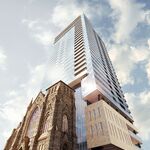Cityplace or All Downtown Condos?
It seems this thread has assigned the Cityplace condos the role as the posterchild for the recent explosion of downtown condo development.
My post is more on the topic of the lessons to be learned from St.Jamestown, and the longterm resale prospects for the many newly built starter condos in the downtown core.
My Background/Perspective
I'm in the market for two residences in the next 3-12 months (condo or otherwise). One for me, and one for my handicapped-yet-independent brother who presently lives in CityHomes public housing.
I work in a sophisticated position in the financial sector, but have not previously been a homeowner and am a real estate novice who has therefore been studying diligently over the past several months
New Condos: Principal or Rental Residences?
An article from the Toronto Star says there were 17000 downtown condo units build from 2001-2006
http://www.thestar.com/News/article/270694 (As a Toronto native I consider "downtown" as being east of the DVP, south of Bloor, west of Dufferin, and north of Lake Ontario)
I wouldn't be surprised if there were to be at least another 17000 units to come online between 2007-2011.
Despite the large number of new units , the following City of Toronto report from 2006 references serious concerns about the supply of rental units
http://www.toronto.ca/planning/pdf/housing_rental.pdf. There it would seem to imply that many(most?) of the new condos are presently principal residences.
My question
Who are these new condo owners, and what will be the resale market for these units in 5-10 years?
Theory 1:
The new condos are mostly first time owners, young professionals employed downtown, 25-40yrs old. In 5-10 years, as they get married and start families, the standard 1 bedroom + den 650sf condo will prove woefully inadequate for 2 adults + children. There are proportionately much fewer 2 bedroom condos, and those that do exist aren't really that suitable for raising a family.
Therefore despite the recent surge in new units, they are mostly geared towards singles/couples without children, and many of the present condo owners will be looking to relocate out of the downtown core in 5-10 years.
They will therefore need to either sell their units to the new generation of 25-40yr old first time owner, or turn their unit into a rental property.
The resale value of their unit will be entirely limited by the earning power of the future downtown early career yuppie and, if recent history is any indication, that earning power will not have increased in real terms in 5-10 years. Thus, there will be little prospect for appreciation in the many thousands of cookie cutter condos in the downtown core.
Further, given the historically low interest rates, and considering that the younger homeowner is usually highly dependent upon a highratio mortgage, we can expect to see a highly inverse correlation between BoC prime and downtown condo resale prices.
Translation: Many of these new cookie cutter condos (glass and concrete with no design) will indeed become tomorrow's St.Jamestown-esque rental units. Albeit more upscale and centrally located. But longterm their only future is as a rental unit, or a short-term residence for their present owner with limited appreciation potential.
Theory 2:
Major cities throughout the world have highly priced downtown real estate. If one looks at cities like New York and London, the price of the downtown realestate is completely out of sync with earning power. The people who can afford to live downtown have accumulated significant wealth, or perhaps simply got into the downtown real estate market at the ground floor.
As Toronto continues to grow, commuting gridlock will worsen, and many mid-career professionals (40-50) will happily pay a premium housing cost to avoid unpleasant commutes.
Similarly, many downtown corporations will pay their entry level employees a premium salary to have them located close to work so they are available for staying late/coming in on the weekends (aka the go-getter New York model)
Toronto is blessed with a huge tract of underveloped land downtown aka the waterfront/railway lands (indeed, almost unmatched in North America I would suggest?) and as the market need moves towards family suitable condos, developers will be happy to oblige. The double income professionals, having build up equity from the appreciation of their starter condos, will be well able to afford these new developments.
While many developments (like City Place) may presently lack a sense of "neigbourhood", the freemarket system will find ways to provide the required bars/restaurants/etc.
As the relatively young City of Toronto begins to build up some real wealth among a broader base of its citizenry, the downtown condo market will become much less susceptible to fluctuations in the BoC rate vis-a-vis mortgage rates.
Translation: Buy the right unit downtown (any unit downtown?), and you've bought yourself a goldmine shortterm residence and mid-term/long-term investment.
Conclusion
Ok, lol, despite the use of bold and underlining this is not some deeply cherished thesis. My present opinion on the above is that I think it is probably 80% #1, and 20%#2. That is to say, that I reckon that 80% of the new units fall into category #1. But as I continue on the RE learning curve, my opinions change every week.
I offer my perspective without any warrany of expertise and I welcome and any feedback.




